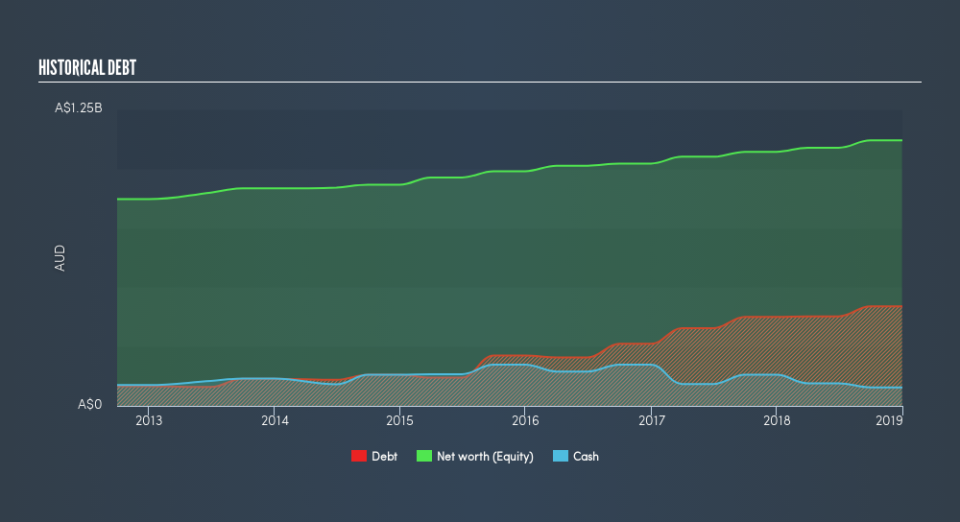These 4 Measures Indicate That Event Hospitality & Entertainment (ASX:EVT) Is Using Debt Extensively

The external fund manager backed by Berkshire Hathaway's Charlie Munger, Li Lu, makes no bones about it when he says 'The biggest investment risk is not the volatility of prices, but whether you will suffer a permanent loss of capital.' When we think about how risky a company is, we always like to look at its use of debt, since debt overload can lead to ruin. Importantly, Event Hospitality & Entertainment Limited (ASX:EVT) does carry debt. But the more important question is: how much risk is that debt creating?
What Risk Does Debt Bring?
Debt assists a business until the business has trouble paying it off, either with new capital or with free cash flow. Ultimately, if the company can't fulfill its legal obligations to repay debt, shareholders could walk away with nothing. However, a more frequent (but still costly) occurrence is where a company must issue shares at bargain-basement prices, permanently diluting shareholders, just to shore up its balance sheet. Of course, debt can be an important tool in businesses, particularly capital heavy businesses. The first step when considering a company's debt levels is to consider its cash and debt together.
Check out our latest analysis for Event Hospitality & Entertainment
What Is Event Hospitality & Entertainment's Debt?
You can click the graphic below for the historical numbers, but it shows that as of December 2018 Event Hospitality & Entertainment had AU$420.1m of debt, an increase on AU$375.4m, over one year. However, because it has a cash reserve of AU$78.1m, its net debt is less, at about AU$342.0m.
A Look At Event Hospitality & Entertainment's Liabilities
Zooming in on the latest balance sheet data, we can see that Event Hospitality & Entertainment had liabilities of AU$255.0m due within 12 months and liabilities of AU$455.1m due beyond that. Offsetting these obligations, it had cash of AU$78.1m as well as receivables valued at AU$64.0m due within 12 months. So its liabilities outweigh the sum of its cash and (near-term) receivables by AU$568.0m.
Event Hospitality & Entertainment has a market capitalization of AU$1.94b, so it could very likely raise cash to ameliorate its balance sheet, if the need arose. But we definitely want to keep our eyes open to indications that its debt is bringing too much risk.
We use two main ratios to inform us about debt levels relative to earnings. The first is net debt divided by earnings before interest, tax, depreciation, and amortization (EBITDA), while the second is how many times its earnings before interest and tax (EBIT) covers its interest expense (or its interest cover, for short). The advantage of this approach is that we take into account both the absolute quantum of debt (with net debt to EBITDA) and the actual interest expenses associated with that debt (with its interest cover ratio).
Event Hospitality & Entertainment has a low net debt to EBITDA ratio of only 1.4. And its EBIT easily covers its interest expense, being 18.6 times the size. So you could argue it is no more threatened by its debt than an elephant is by a mouse. Fortunately, Event Hospitality & Entertainment grew its EBIT by 4.9% in the last year, making that debt load look even more manageable. The balance sheet is clearly the area to focus on when you are analysing debt. But it is future earnings, more than anything, that will determine Event Hospitality & Entertainment's ability to maintain a healthy balance sheet going forward. So if you want to see what the professionals think, you might find this free report on analyst profit forecasts to be interesting.
Finally, a company can only pay off debt with cold hard cash, not accounting profits. So we clearly need to look at whether that EBIT is leading to corresponding free cash flow. Considering the last three years, Event Hospitality & Entertainment actually recorded a cash outflow, overall. Debt is usually more expensive, and almost always more risky in the hands of a company with negative free cash flow. Shareholders ought to hope for and improvement.
Our View
Neither Event Hospitality & Entertainment's ability to convert EBIT to free cash flow nor its level of total liabilities gave us confidence in its ability to take on more debt. But the good news is it seems to be able to cover its interest expense with its EBIT with ease. We think that Event Hospitality & Entertainment's debt does make it a bit risky, after considering the aforementioned data points together. That's not necessarily a bad thing, since leverage can boost returns on equity, but it is something to be aware of. In light of our reservations about the company's balance sheet, it seems sensible to check if insiders have been selling shares recently.
When all is said and done, sometimes its easier to focus on companies that don't even need debt. Readers can access a list of growth stocks with zero net debt 100% free, right now.
We aim to bring you long-term focused research analysis driven by fundamental data. Note that our analysis may not factor in the latest price-sensitive company announcements or qualitative material.
If you spot an error that warrants correction, please contact the editor at editorial-team@simplywallst.com. This article by Simply Wall St is general in nature. It does not constitute a recommendation to buy or sell any stock, and does not take account of your objectives, or your financial situation. Simply Wall St has no position in the stocks mentioned. Thank you for reading.

